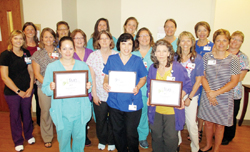
Local Hospital Wins Series of Awards for Excellence, Technology
The trophy case at Aspirus Langlade Hospital is getting crowded.
The hospital was recently recognized for everything from excellence in health care to how it uses technology to partner with its patients.
The separate series of accolades was presented by the Professional Research Consultants Inc. (PCR) and the most wired designation bestowed by the American Hospital Association’s (AHA) Health Forum.
I am excited to be part of an organization where our priority is to deliver an excellent experience for all, Hospital Administrator Andy Barth said. I’m very proud of our team here at Aspirus Langlade Hospital & Clinics for providing exceptional service and quality care for the patients and families we serve.
The Excellence in Healthcare Awards recognize organizations and individuals who achieve excellence throughout the year by improving patient experiences based on surveys of their patients. The ceremony was held during the 2017 Excellence in Healthcare Conference in Austin, TX, June 2.
The list of accolades for Aspirus Langlade Hospital includes:
—5-Star Excellence Award for Inpatient Services in OB/GYN Overall Quality of Care
—5-Star Excellence Award for Inpatient Discharge Instructions
—4-Star Excellence Award for Inpatient Services in Medical/Surgical/ICU Overall Quality of Care
Ranking in the top 10 percent of PRC’s database of national health care organizations earned Aspirus Langlade Hospital these 5-Star Awards, while the 4-Star Award represents the top 25 percent.
It is an honor to recognize Aspirus Langlade Hospital with these Excellence in Healthcare Awards for their deserving work, Joe M. Inguanzo, Ph.D., president and CEO of PRC, said. It takes true dedication and determination to achieve this level of excellence in healthcare and Aspirus Langlade Hospital has shown their commitment to making their hospital a better place to work, a better place to practice medicine and a better place for patients to be treated.
The most wired designation is according to the 19th Annual Health Care’s Most Wired survey, released this week by the American Hospital Association’s Health Forum.
The Aspirus system is very proud of this recognition, Barth said. It demonstrates the effective use of technology to enhance the patient experience across our health system. The award is a result of many people across the system working together to leverage every available technology option to transform the delivery of care and improve patient access, quality and control costs.
According to the survey, Most Wired hospitals are using smart phones, telehealth and remote monitoring to create more ways for patients to access health care services and capture health information.
This isn’t an award for having a great electronic health record, or a pretty website, Todd Richardson, senior vice president of information technology and chief information officer for Aspirus. This is about marrying solid technology with the operations of our business and effectively using it to improve patient care and streamline operations. That’s why I’m so proud that Aspirus has been recognized.
That pride spans the system, because every one of Aspirus’ eight hospitals was named a Most Wired Hospital.
The Most Wired hospitals are using every available technology option to create more ways to reach their patients in order to provide access to care, AHA President and CEO Rick Pollack said. They are transforming care delivery, investing in new delivery models in order to improve quality, provide access and control costs.
Innovation in patient care embraces emerging technologies and underscores the need for secure patient information exchange. Hospitals have increased their use of sophisticated IT monitoring systems to detect patient privacy breaches, monitor for malicious activities or policy violations and produce real-time analysis of security alerts.
Most Wired hospitals are transforming care delivery with knowledge gained from data and analytics. They are investing in analytics to support new delivery models and effective decision-making and training clinicians on how to use analytics to improve quality, provide access and control costs.
Source: Antigo Daily Journal
